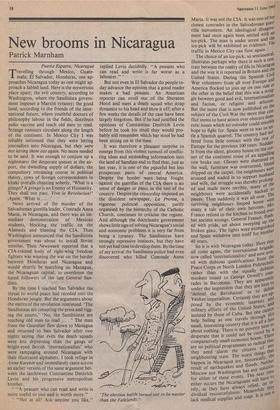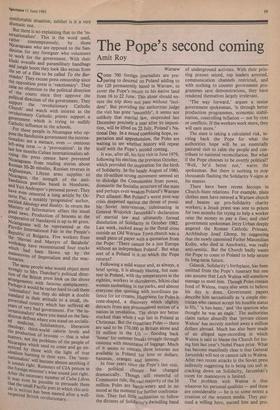New brooms in Nicaragua
Patrick Marnham
Puerta Esparta, Nicaragua
Travelling through Mexico, Guate- mala, El Salvador, Honduras, one ap- proaches Nicaragua today as one might ap- proach a fabled land. Here is the mysterious place apart; the evil country, according to Washington, where the Sandinista govern- ment imposes a Marxist tyranny; the good land, according to the friends of the inter- national future, where youthful doctors of philosophy labour in the fields, distribute polio vaccine and teach old men to read. Strange rumours circulate along the length of the continent. In Mexico City I was reliably informed that they were letting journalists into Nicaragua, but they were not letting them out again. No more needed to be said. It was enough to conjure up a nightmare: the desperate queues at the air- port, the dwindling supply of dollars, the compulsory retraining course in political theory, rows of foreign correspondents in khaki overalls chanting soberly, 'What is a gringo? A gringo is an Enemy of Humanity. They shall not pass. Viva la Revolucion!' Again. 'What is . . . '
News arrived of the murder of the Salvadorean guerilla leader, Comrade Anna Maria, in Nicaragua, and there was an im- mediate demonstration of Mexican students, blocking the traffic on the Alameda and blaming the CIA. Then Washington announced that the Sandinista government was about to install Soviet missiles. Then Newsweek reported that a CIA-trained body of right-wing freedom fighters was winning the war on the border between Honduras and Nicaragua and would shortly be marching on Managua, the Nicaraguan capital, to overthrow the hated followers of the late General San- dino.
By the time I reached San Salvador the threat to world peace had receded into the Honduran jungle. But the arguments about the merits of the revolution continued. 'The Sandinistas are censoring the press and rigg- ing the courts."No, the Sandinistas are teaching old men to read . . . ' The man from the Guardian flew down to Managua and returned to San Salvador after two nights saying that even the death squads were less depressing than the gangs of bright-eyed British 'internationalists' who were rampaging around Nicaragua with their illustrated alphabets. I took refuge in Anna Karen in and immediately came across an earlier version of the same argument bet- ween the landowner Constantine Dmitrich Levin and his progressive metropolitan brother.
"A peasant who can read and write is more useful to you and is worth more." "Not at all! Ask anyone you like," replied Levin decidedly. "A peasant who can read and write is far worse as a labourer." ' But not even in El Salvador do people to- day advance the opinion that a good reader makes a bad peasant. An American reporter can stroll out of the Sheraton Hotel and meet a death squad who strap dynamite to his head and blow it off; after a few weeks the details of the case have been largely forgotten. But if he had justified the opinions of Constantine Dmitrich Levin before he took his stroll they would pro- bably still remember which bar stool he had been sitting on at the time.
It was therefore a pleasant surprise to emerge from this violent turmoil of conflic- ting ideas and misleading information into the land of Sandino and to find that, just as last year, it is one of the peaceful but less prosperous parts of central America. Despite the border wars being fought against the guerillas of the CIA there is no sense of danger or panic in the rest of the country. Despite the censorship imposed on the dissident newspaper, La Prensa, a vigorous political opposition, partly organised by the hierarchy of the Catholic Church, continues to criticise the regime. And although the doctrinaire government shows little sign of solving Nicaragua's social and economic problems it is very far from being a tyranny. The Sandinistas have strongly repressive instincts, but they have not yet had time to develop them. By the time of my arrival the Sandinista police had even discovered who killed Comrade Anna
'The election battle turned out to be nastier than the Falklands.'
Maria. It was not the CIA. It was one of her closest comrades in the Salvodorean guer- rilla movement. An ideological disagree- ment had once again been settled with an ice-pick. The man is under arrest and the ice-pick will be exhibited as evidence. The traffic in Mexico City can flow again. The choice of an ice-pick, so sentimental, illustrates perhaps why there is such a con- trast between the reality of life in Nicaragua and the way it is reported in Britain and the United States. During the Spanish Civil War volunteers from all over Europe and America flocked to join up on one side or the other in the belief that this was a strug' gle between good and evil, internationalism and facism, or religion and atheism. But the more that is now published on the subject of the Civil War the more that con- flict seems to have arisen over obscure dom- estic issues which no outsider could sensiblY hope to fight for. Spain went to war to set- tle a Spanish quarrel. The country had sof- fered from little contact with the rest of Europe for the previous 100 years. Sudden- ly from the silent, gloomy house on the cor- ner of the continent noise of an appalling row broke out. Glasses were shattered ohd the wall, furniture was overturned, hlon dripped on the carpet. the neighbours wet'', aroused and waded in to support husbano and wife, the struggle was thereby prolong ed and made more terrible, many of the neighbours were accidentally hacked to pieces. Then suddenly it was all over. The surviving neighbours limped home Yaw many a tale of their own heroism. Mrs Franco retired to the kitchen to brood v,r e her ancient wrongs. General Franco, flousn- ed with pride, set about sweeping 1-IP th,e broken glass. The lights were extinguishear and yendSapars.in withdrew into itself for anoth
40 e
So it is with Nicaragua today. Here they all come again, the international brigade, now called 'internationalists' and now arm ed with dubious qualifications from the Peace Corps or North London Polytechnic rather than with the equally dubious muskets issued to George Orwell's coirir rades in Barcelona. They are apParent!, under the impression that they are here to 'defend the Revolution' or to defeat Yankee imperialism. Certainly they are 131::-1 posed by the economic interests anal', military efforts of the United States, this help by those of Cuba. But one carit.°P,s' help feeling as one travels through small, interesting country that it is alll a r about nothing. There is no poverty r Y '„ desperate that it could not be curedTbher:
are no political programmes so radical Iahnayt comparatively small economic boom. they need alarm the 'citizens neighbouring state. The worst thinogfs
that happen , in Nicaragua are, historicallY,. result of earthquakes and floods. N.eirn:ii Moscow nor Washington has any solul.w_ for either of these events. The .next to
either occurs the Nicaraguans w. hoanve in- rely, as they have always rehe ,
they
dividual resourcefulness. Mean It lack medical supplies and soaP. It is not a
comfortable situation, neither is it a very dramatic one.
But there is no explaining that to the 'in- ternationalists'. This is the word used,
rather contemptuously, by those Nicaraguans who are opposed to the San- dinistas for any foreigner who volunteers to work for the government. With their khaki overalls and paramilitary handbags and jungle boots they look like extras from
the set of a film to be called To the Bar- ricades! They excuse press censorship since the opposition press is 'reactionary'. They raise no objection to the political direction of the courts since they approve the political direction of the government. They support the 'revolutionary Catholic Church' and watch with interest as the revolutionary Catholic priests support a government which is trying to nullify Catholic influence in the schools. For those people in Nicaragua who op- Pose the Sandinista government the interna- tionalists are a menace, even — ominous left-wing term — a 'provocation'. In the last few months Cuban internationalists ad- vising the press censor have prevented Nicaraguans from reading stories about Russian SS-20 missiles, Russian reverses in Afghanistan, Libyan arms supplies to Nicaragua, the strength of the anti- Sandinista guerillas based in Honduras, and Yuri Andropov's personal power. They have even censored a long article by Oc- tavio Paz, a notably 'progressive' author, entitled Ideology and Reality. In return the Ministry of Information offers the usual good news. Production of brooms at the cooperative of Nandayosi is up to 60 gross. Nicaraguans will be represented at the Plovdiv International Fair in the People's Republic of Bulgaria. Five workers from the `Heroes and Martyrs of Batahola' workshop have reconstructed four trucks which had been blown up by the
Manoeuvres of Imperialism and the reac- tionaries. The same people who would object most strongly to Mrs Thatcher's political direc- tion of the British press look on the above Perhaps with fatuous complacency. Perha
ps it would be rather hard to call them colonialists' but they do adopt a double standard in their attitude to a small, inn- poverished country which has suffered 40 Years of very bad government. For 'the in- ternationalists' where you stand on the San- dinistas defines where you stand on socialis- ed medicine, Solzhenitsyn, liberation theology, third-world calorie levels and the production of brooms — that is what matters, not the problems of the people of Nicaragua which tend to come and go un- noticed by those with the light of true idealism burning in their eyes. The 'inter- nationalists' will become almost anything if
it sounds right. Rumours of CIA poison in
the foreign minister's wine sound just right. After the necessary number of Cuba Libres it may even be possible to persuade them that the small Pacific port in which this arti- cle is written has been named after a well- respected British revolutionary.











































 Previous page
Previous page